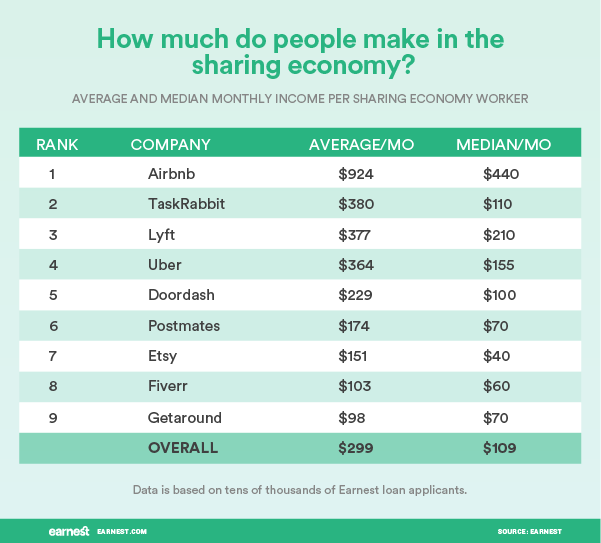Photo by Hero Images/Getty Images
It seems like everywhere you go, there are people hustling. In your favorite grocery store, people are looking at their cell phones, going through other people’s grocery lists that they’ve been hired to pick up. You go out for happy hour, use a Lyft to get home, and your driver tells you that they’ve picked up the gig to make extra money.It also seems like the gig economy has no age limits: Millennials, Boomers, and GenXers are all on the freelance bandwagon. In the midst of all of this frenetic busyness, it is important to ask: Is the gig economy a scam distracting people from focusing on getting full-time jobs wth real benefits like paid vacation, sick days and low-cost health insurance, or is it an opportunity to cultivate lifestyle flexibility and freedom that most 9-5 jobs seem unwilling to give their employees?“I love the gig economy,” Miranda Marquit, a freelance finance writer and co-creator of Adulting.tv told me. “It's been good to me. I supported my family as the primary breadwinner for 11 years as a freelancer. But I also know that sometimes it can be very stressful, knowing that you could lose a third of your income in a moment.”But if the chance to be your own boss, set your own hours and take time off to travel or anything else whenever you please, sounds too good to pass up, here are some things to consider:Gig economy participants working at places like Uber, Lyft, TaskRabbit and Handy, among other places, often cobble together numerous projects or side-hustles to increase their income. Some people fall into this way of life after failed or prolonged job searches, while others prefer juggling freelancing work to a 9-5 job. If you’re lucky, some gigs are really lucrative. But there are a few issues that aren’t being addressed, like the hidden costs of having to pay out-of-pocket for benefits like health insurance, retirement programs, and work-related expenses.Gig workers who are paid as freelancers (meaning they get a 1099 at the end of the year instead of a W-2) are also not granted unemployment if they are let go, and they may have less recourse than full-time employees when dealing with workplace issues like discrimination or harassment."Freelance workers are highly vulnerable," the New Yorker recently noted. "They have little institutional support and few, if any, supervisors. They are transient and easily replaceable as well." It can also be stressful to juggle multiple jobs that may have you pulling all-nighters at some times, but leave you desperate for work at others—an issue that has led to criticism of the modern incarnation of freelance work.“I believe the gig economy is solid but also trendy,” financial coach and entrepreneur Marsha Barnes, creator of The Finance Bar told me. “While it’s somewhat of a new way of earning and living, it often seems a bit frightening [in terms] of what the end of this looks like for those that begin to grow out of it if they choose to.”Gig workers may wonder what comes after their jobs end, if, say they startup they're working for goes belly up, or if their skills are transferable to other careers. If your skills are transferable, yo may well be able to find full-time employment later, but much depends on your experience and specific skill set.If you’re going to succeed in the gig economy, you need a strategy.One approach is to diversify your gigs. Most people focus their energy on one or two side-hustles when in fact they may be able to do the same type of work for a number of different businesses. Freelance writers are a great example of being able to provide the same service but have the ability to work with numerous clients.Look for opportunities often. Some of the most successful gig economy participants are hustling on a daily basis. “Being in the gig economy is hard work," Marquit said. "For instance, I myself just lost two PR agency clients I've had for years because they've decided to hire in-house writers. It means I have to work a little harder to find new gigs to replace those.”Beware of scams. Common examples include multi-level marketing schemes that require you to buy products upfront, or fraudulent work-from-home offers that ask for money or personal data.Do the math on how much you have to pay out-of-pocket costs to do the gig. Gig workers who are employed by ride-hail app companies, or who participate in peer-to-peer car-sharing, may be using their own cars, in which case they also have to factor in the cost of gas, car maintenance, and any damage that passengers may cause. If your costs exceed your expected earnings, then it's probably not worth it, unless you have a solid plan for turning a profit further down the line.It's also important to think abut how freelancing affects your finances long-term, in terms of saving for retirement and the need to pay estimated taxes (hint: if you make thousands of dollars a year from freelancing and don't have big deductions to offset Uncle Sam's cut of your earnings, then you probably do).Many people forget (or are unable) to set aside the funds they need to pay for them in advance, creating huge tax bills in the spring. In a nutshell: If taxes aren't being taken out of your paycheck, you need to set aside money to pay for them. Start a tax fund now to help ease the pain on Tax Day.Lastly, remember the importance of saving for the long term. Whereas many employees at big companies are automatically enrolled in retirement plans that incentivize you to save for retirement by offering matching funds, when you're a freelancer, you have to set that money aside on your own. And that can be tough to do if you are barely making ends meet in the first place.Michelle Jackson runs the blog and podcast Michelle is Money Hungry. She's still on her debt freedom journey, but is getting closer to the end. When she's not blogging, you may find her roaming around the mountains of Colorado. Follow Michelle Jackson on Twitter.
It can also be stressful to juggle multiple jobs that may have you pulling all-nighters at some times, but leave you desperate for work at others—an issue that has led to criticism of the modern incarnation of freelance work.“I believe the gig economy is solid but also trendy,” financial coach and entrepreneur Marsha Barnes, creator of The Finance Bar told me. “While it’s somewhat of a new way of earning and living, it often seems a bit frightening [in terms] of what the end of this looks like for those that begin to grow out of it if they choose to.”Gig workers may wonder what comes after their jobs end, if, say they startup they're working for goes belly up, or if their skills are transferable to other careers. If your skills are transferable, yo may well be able to find full-time employment later, but much depends on your experience and specific skill set.If you’re going to succeed in the gig economy, you need a strategy.One approach is to diversify your gigs. Most people focus their energy on one or two side-hustles when in fact they may be able to do the same type of work for a number of different businesses. Freelance writers are a great example of being able to provide the same service but have the ability to work with numerous clients.Look for opportunities often. Some of the most successful gig economy participants are hustling on a daily basis. “Being in the gig economy is hard work," Marquit said. "For instance, I myself just lost two PR agency clients I've had for years because they've decided to hire in-house writers. It means I have to work a little harder to find new gigs to replace those.”Beware of scams. Common examples include multi-level marketing schemes that require you to buy products upfront, or fraudulent work-from-home offers that ask for money or personal data.Do the math on how much you have to pay out-of-pocket costs to do the gig. Gig workers who are employed by ride-hail app companies, or who participate in peer-to-peer car-sharing, may be using their own cars, in which case they also have to factor in the cost of gas, car maintenance, and any damage that passengers may cause. If your costs exceed your expected earnings, then it's probably not worth it, unless you have a solid plan for turning a profit further down the line.It's also important to think abut how freelancing affects your finances long-term, in terms of saving for retirement and the need to pay estimated taxes (hint: if you make thousands of dollars a year from freelancing and don't have big deductions to offset Uncle Sam's cut of your earnings, then you probably do).Many people forget (or are unable) to set aside the funds they need to pay for them in advance, creating huge tax bills in the spring. In a nutshell: If taxes aren't being taken out of your paycheck, you need to set aside money to pay for them. Start a tax fund now to help ease the pain on Tax Day.Lastly, remember the importance of saving for the long term. Whereas many employees at big companies are automatically enrolled in retirement plans that incentivize you to save for retirement by offering matching funds, when you're a freelancer, you have to set that money aside on your own. And that can be tough to do if you are barely making ends meet in the first place.Michelle Jackson runs the blog and podcast Michelle is Money Hungry. She's still on her debt freedom journey, but is getting closer to the end. When she's not blogging, you may find her roaming around the mountains of Colorado. Follow Michelle Jackson on Twitter.
Advertisement
The Downside to Gig Work
Advertisement

How to Win at the Gig Economy
Advertisement
